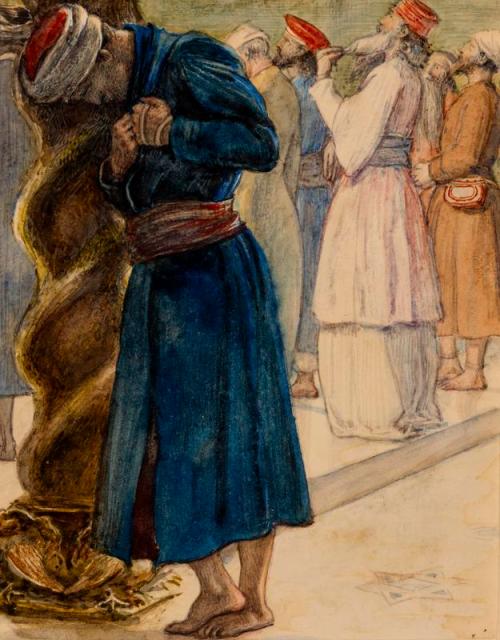Humility, that misunderstood virtue, saves us from the theatrical pretenses to which all of us are drawn. Who hasn’t boasted occasionally of something they’ve accomplished? Who hasn’t been grateful, even in the secret of their hearts, that they aren’t in the class of people whom they view to be beneath them in intellectual capacity, religious actions, cultural possibilities, or moral behavior?
The Pharisee praying in the synagogue was not exaggerating. He most probably did keep the law, for that is what Pharisees did: they followed the legal traditions ascribed to the traditions of the Fathers. However, the special kind of prayer called the berakhah or blessing, so much a part of Judaism, is meant to be an expression of wonder at how blessed God is. For example, a typical blessing Jews recite before eating or drinking would acknowledge and bless God as the creator of the food and drink about to be enjoyed. The blessing for bread praises God as the one who brings forth bread from the earth. The blessing for wearing new clothing praises God as the one who clothes the naked.
These blessing prayers make clear that our true dignity lies infinitely more in God than in ourselves, and can only be reached when we are united to God. The first truth that leads us to great wonder in God’s glory and goodness is found in Genesis. We are created from nothing. This very gift of an eternal existence makes us utterly dependent on God and acutely aware of our own unworthiness. In love God created us and in love He upholds us. We have no being of our own but what we receive from God. We should be blessing God for his glory!
The tax collector in this passage is a portrayal of all those who realize that they are dependent on God, gifted with life and an eternal purpose whose object is God. They recognize that they can never come to completion without being perfectly united to God. In this case, sorrow for sins, even the grieving that comes from knowing that we will never be all that we were created to be, is appropriate and actually a necessary part of our relationship with God. Does this also sound familiar? We begin every Mass with the Penitential Rite followed by the Gloria. We take our place once again as God’s dear children, so in need of his grace, to live lives of truth and goodness and beauty.
So today, bless and thank God as the source of every good in your life, acknowledge your dependence on God to reach the final completion of your life in Christ Jesus. Express sorrow for your sins and never stop believing in God’s love for you.
La humildad, esa virtud mal entendida, nos salva de las pretensiones exageradas a las que todos nos sentimos atraídos. ¿Quién no ha persumido alguna vez de algo que ha logrado? ¿Quién no ha agradecido, incluso en el secreto de su corazón, no pertenecer a la clase de personas que considera inferiores a ellos en capacidad intelectual, acciones religiosas, posibilidades culturales o comportamiento moral?
El fariseo que oraba en la sinagoga no exageraba. Lo más probable es que cumpliera la ley, porque eso es lo que hacían los fariseos: seguían las tradiciones legales atribuidas a las tradiciones de los Padres. Sin embargo, el tipo especial de oración llamada berakhah o bendición, que forma parte del judaísmo, pretende ser una expresión de asombro por lo bendito que es Dios. Por ejemplo, una bendición típica que los judíos recitan antes de comer o beber reconocería y bendeciría a Dios como el creador de la comida y bebida que se va a disfrutar. La bendición del pan alaba a Dios como quien saca el pan de la tierra. La bendición por usar ropa nueva alaba a Dios como quien viste al desnudo.
Estas oraciones de bendición dejan claro que nuestra verdadera dignidad reside infinitamente más en Dios que en nosotros mismos, y sólo puede alcanzarse cuando estamos unidos a Dios. La primera verdad que nos lleva a un gran asombro por la gloria y la bondad de Dios se encuentra en Génesis. Somos creados de la nada. Este mismo don de una existencia eterna nos hace completamente dependientes de Dios y profundamente conscientes de nuestra propia indignidad. Por amor Dios nos creó y por amor nos sostiene. No tenemos ningúna vida propia sino la que recibimos de Dios. ¡Deberíamos estar bendiciendo a Dios por su gloria!
El recaudador de impuestos en este pasaje es un retrato de todos aquellos que se dan cuenta de que dependen de Dios, que están dotados de vida y un propósito eterno cuyo objeto es Dios. Reconocen que nunca podrán llegar a su plenitud sin estar perfectamente unidos a Dios. En este caso, el dolor por los pecados, incluso el duelo que surge al saber que nunca seremos todo lo que fuimos creados para ser, es apropiado y, de hecho, una parte necesaria de nuestra relación con Dios. ¿Esto también te suena familiar? Comenzamos cada Misa con el Rito Penitencial y luego la Gloria. Ocupamos nuestro lugar una vez más como queridos hijos de Dios, tan necesitados de su gracia, para vivir vidas de verdad, bondad y belleza.
Así que hoy, bendice y agradece a Dios como fuente de todo bien en tu vida, reconoce tu dependencia de Dios para alcanzar la culminación final de tu vida en Cristo Jesús. Expresa dolor por tus pecados y nunca dejes de creer en el amor de Dios por ti.

Sr. Kathryn James Hermes, FSP, is an author and offers online evangelization as well as spiritual formation for people on their journey of spiritual transformation and inner healing. Website: www.touchingthesunrise.com My Books: https://touchingthesunrise.com/books/
Public Facebook Group: https://www.facebook.com/groups/srkathrynhermes/ HeartWork Spiritual Formation Group: https://touchingthesunrise.com/heartwork/
Feature Image Credit: Aberdeen Art Gallery, commons.wikimedia.org/wiki/File:Parable_-_The_Pharisee_and_the_Publican_-_Sir_John_Everett_Millais_-_ABDAG004397.jpg

